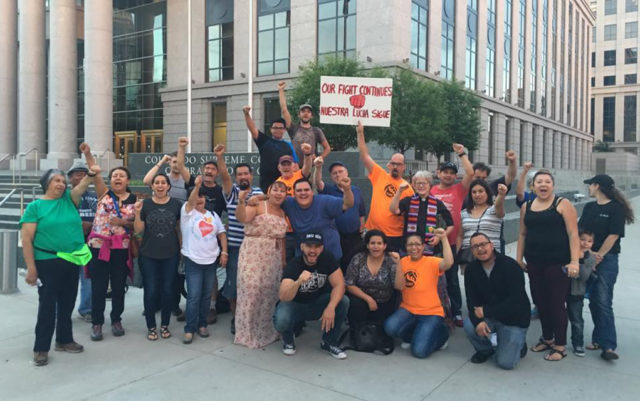
As the 2016 U.S. Supreme Court term comes to a close, the Justices announced several decisions within the last week, ruling on issues from abortion to government corruption to affirmative action and even gun control. But following Justice Scalia’s unexpected death in February, and the refusal of Congress to cooperate with President Obama in replacing him, the remaining eight justices were left with a 4-4 tie on the issue of immigration.
The United States v. Texas case challenged the 2014 Department of Homeland Security (DHS) immigration policies, principally the Deferred Action for Parents of Americans (DAPA) program. Had the DAPA program been implemented, it would have provided temporary deportation relief to approximately 4 million undocumented parents of U.S.-born children, 80,000 in Colorado according to immigrant rights groups.
After the Court’s announcement on June 23, activists and advocates gathered across the country at vigils and events in support of immigrant families and calling for immigration relief. In Colorado, groups gathered outside the State Supreme Courthouse.
“The Supreme Court decision, while not entirely unexpected, is really disheartening because now the timeline toward some kind of relief for the immigrant community that is constantly under attack by deportation is a long way off,” says Jennifer Piper with the American Friends Service Committee (AFSC), a national nonprofit organization celebrating its 100th year working with immigrants and refugees.
Piper says the people she works with in Colorado have expressed a variety of emotions regarding the Supreme Court’s announcement, from anger to disappointment to resilience.
“This is something that would allow them a sense of safety, and security, and stability within their life here in Colorado,” Piper says. “I think having the hope of that taken away really has shaken the community. That said, there wasn’t a single person [at the vigils and other events last week] who was ready to throw in the towel. I think it’s only galvanized the community to work harder, to organize more immigrants and to reach out to more allies.”
According to a recent poll released by the nonpartisan research group Public Religion Research Institute, 73 percent of Americans, including 65 percent of Republicans, support the DAPA program, allowing parents of U.S. citizen children to stay in the country for three years without fear of deportation — people DHS has classified as low-priority for deportation.
Shortly after the DAPA program was announced, however, the state of Texas sued the federal government and in January 2015 Federal Judge Andrew Hanen issued a preliminary injunction, later upheld by an appeals court, blocking the implementation of the program until the case could play out. With the Supreme Court’s equally divided decision, the preliminary injunction remains in effect while the case continues in Texas.
“In a way it’s a non-decision,” says prominent immigration law professor Hiroshi Motomura. “It is not a ruling by the Supreme Court, it’s more of a decision not to decide.”
The Court’s ruling is only one line: “The judgment is affirmed by an equally divided court,” and as such doesn’t set any precedent that could undercut other immigration policies or priorities set by the administration.
“In theory the administration should not be deporting people who are low priorities,” Motomura says. “One possibility is that the field offices will follow the [priority] guidelines. Another possibility is that the field offices will ignore the guidelines, and I think my fear is that they will feel empowered to do so by over-reading what the Supreme Court did. But that would be contrary to the fact that the President has decided they should prioritize people for deportation who have criminal records or are a national security risk.”
The Supreme Court’s ruling also allows for a future decision by the Supreme Court once the bench is full. Although the Obama administration has yet to comment on whether or not it will take further action, Motomura says there is the option, given the missing ninth justice, to ask the Supreme Court for a re-hearing, and he believes the federal government has a strong political reason to do so.
“This deserves to be heard in full court,” he says.
But it’s likely Congress won’t confirm any Presidential nominee to the Supreme Court until after the November election, as many Senate Republicans have refused to consider the nomination of Judge Merrick Garland since March.
“It’s an institutional failure for the Senate to not even consider the appointment and to have an incomplete court,” Motomura says. “There’s a human cost and there’s an institutional failure [to the United States v. Texas decision.] But ultimately I think this is going to turn on the election both in terms of the Supreme Court and in terms of immigration policy.”
Since the 1952 Immigration Act and confirmed by the 2002 Homeland Security Act, DHS, as a function of a presidential administration, is charged with national immigration enforcement and policies. The impending court case in Texas challenges this, which is why activist organizations like the AFSC are further determined to see national immigration legislation, not just policy.
“What that means for us is really refocusing our efforts on limiting the scope of deportations and their impacts on families and individuals,” Piper says. “And to make sure there are people in power who will work for a just and humane immigration policy and then pushing them to actually pass legislation that would address the crisis our communities are in.”














